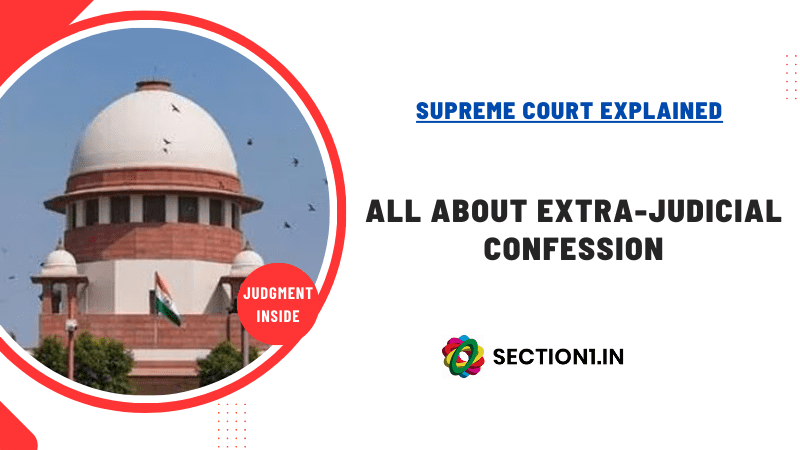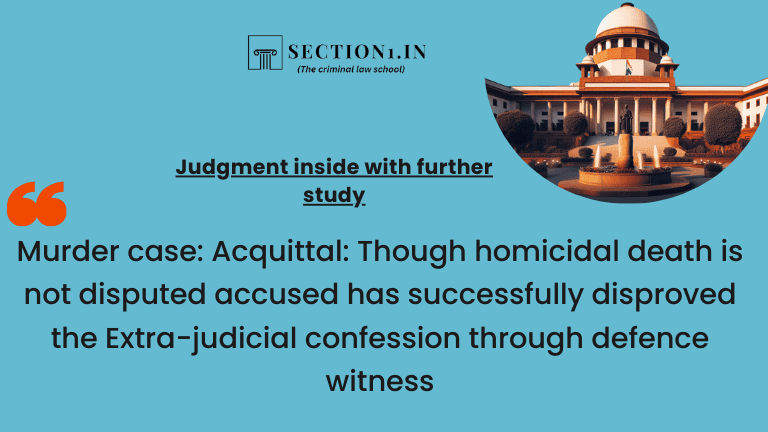- Confessions may be divided into two classes, i.e. judicial and extra judicial. Judicial confessions are those which are made before Magistrate or Court in the course of judicial proceedings. Extra judicial confessions are those which are made by the party elsewhere than before a Magistrate or Court. Extra judicial confessions are generally those made by a party to or before a private individual which includes even a judicial officer in his private capacity. It also includes a Magistrate who is not especially empowered to record confessions under Section 164 of the CrPC or a Magistrate so empowered but receiving the confession at a stage when Section 164 does not apply. As to extra judicial confessions, two questions arise: (i) were they made voluntarily? And (ii) are they true? As the Section enacts, a confession made by an accused person is irrelevant in a criminal proceedings, if the making of the confession appears to the Court to have been caused by any inducement, threat or promise, (1) having reference to the charge against the accused person, (2) proceeding from a person in authority, and (3) sufficient, in the opinion of the Court to give the accused person grounds which would appear to him reasonable for supposing that by making it he would gain any advantage or avoid any evil of a temporal nature in reference to the proceedings against him. It follows that a confession would be voluntary if it is made by the accused in a fit state of mind, and if it is not caused by any inducement, threat or promise which has reference to the charge against him, proceeding from a person in authority. It would not be involuntary, if the inducement, (a) does not have reference to the charge against the accused person, or (b) it does not proceed from a person in authority; or (c) it is not sufficient, in the opinion of the Court to give the accused person grounds which would appear to him reasonable for supposing that, by making it, he would gain any advantage or avoid any evil of a temporal nature in reference to the proceedings against him. Whether or not the confession was voluntary would depend upon the facts and circumstances of each case, judged in the light of Section 24 of the Evidence Act. The law is clear that a confession cannot be used against an accused person unless the Court is satisfied that it was voluntary and at that stage the question whether it is true or false does not arise. If the facts and circumstances surrounding the making of a confession appear to cast a doubt on the veracity or voluntariness of the confession, the Court may refuse to act upon the confession, even if it is admissible in evidence. One important question, in regard to which the Court has to be satisfied with is, whether when the accused made confession, he was a free man or his movements were controlled by the police either by themselves or through some other agency employed by them for the purpose of securing such a confession. The question whether a confession is voluntary or not is always a question of fact. All the factors and all the circumstances of the case, including the important factors at the time given for reflection, scope of the accused getting a feeling of threat, inducement or promise, must be considered before deciding whether the Court is satisfied that its opinion, the impression caused by the inducement, threat or promise, if any, has been fully removed. A free and voluntary confession is deserving of highest credit, because it is presumed to flow from the highest sense of guilt. [See R. V. Warwickshall: (1783) Lesch 263)]. It is not to be conceived that a man would be induced to make a free and voluntary confession of guilt, so contrary to the feelings and principles of human nature, if the facts confessed were not true. Deliberate and voluntary confessions of guilt, if clearly proved, are among the most effectual proofs in law. An involuntary confession is one which is not the result of the free will of the maker of it. So, where the statement is made as a result of the harassment and continuous interrogation for several hours after the person is treated as an offender and accused, such statement must be regarded as involuntary. The inducement may take the form of a promise or of threat, and often the inducement involves both promise and threat, a promise of forgiveness if disclosure is made and threat of prosecution if it is not. (See Woodroffe Evidence, 9th Edn. Page 284). A promise is always attached to the confession, alternative while a threat is always attached to the silence alternative; thus, in the one case the prisoner is measuring the net advantage of the promise, minus the general undesirability of a false confession, as against the present unsatisfactory situation; while in the other case he is measuring the net advantages of the present satisfactory situation, minus the general undesirability of the confession against the threatened harm. It must be borne in mind that every inducement, threat or promise does not vitiate a confession. Since the object of the rule is to exclude only those confessions which are testimonially untrustworthy, the inducement, threat or promise must be such as is calculated to lead to an untrue confession. On the aforesaid analysis the Court is to determine the absence or presence of inducement, promise etc. or its sufficiency and how or in what measure it worked on the mind of the accused. If the inducement, promise or threat is sufficient in the opinion of the Court, to give the accused person grounds which would appear to him reasonable for supposing that by making it he would gain any advantage or avoid any evil, it is enough to exclude the confession. The words ‘appear to him’ in the last part of the section refer to the mentality of the accused. (See State of Rajasthan v. Raja Ram, (2003) 8 SCC 180).
-
An extra judicial confession, if voluntary and true and made in a fit state of mind, can be relied upon by the Court. The confession will have to be proved like any other fact. The value of the evidence as to confession, like any other evidence, depends upon the veracity of the witness to whom it has been made. The value of the evidence as to the confession depends on the reliability of the witness who gives the evidence. It is not open to any Court to start with a presumption that extra judicial confession is a weak type of evidence. It would depend on the nature of the circumstances, the time when the confession was made and the credibility of the witnesses who speak to such a confession. Such a confession can be relied upon and conviction can be founded thereon if the evidence about the confession comes from the mouth of witnesses who appear to be unbiased, not even remotely inimical to the accused, and in respect of whom nothing is brought out which may tend to indicate that he may have a motive for attributing an untruthful statement to the accused, the words spoken to by the witness are clear, unambiguous and unmistakably convey that the accused is the perpetrator of the crime and nothing is omitted by the witness which may militate against it. After subjecting the evidence of the witness to a rigorous test on the touchstone of credibility, the extra judicial confession can be accepted and can be the basis of a conviction if it passes the test of credibility.
xxx
- In the result, the appeals are allowed. The conviction of the accused appellant under Section 302 of the IPC is set aside. He is acquitted of the charge framed against him. He shall be set at liberty forthwith if not required to be detained in connection with any other offences.
Accused Acquitted.
PARTY: Ramanand @ Nandlal Bharti vs. State of Uttar Pradesh CRIMINAL APPEAL NOS. 64-65 OF 2022 – OCTOBER 13, 2022 – 3 Judge Bench.
https://main.sci.gov.in/supremecourt/2021/17765/17765_2021_9_1503_38897_Judgement_13-Oct-2022.pdf






